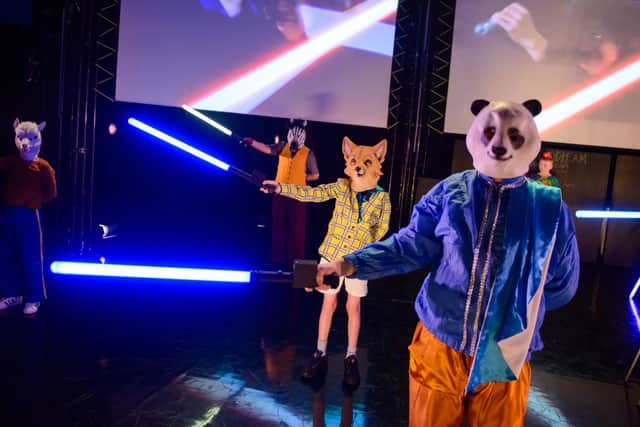

Lucy Gaizely and Gary Gardiner have been working with four Scottish high schools to create Thank U, Next, a dance-theatre piece exploring the colourful and ever-evolving world of cosplay. Interview by Mark Fisher
If someone talked to you about bubblegum goth, would you know what they were on about? How about dark academia or angel-core? Would they be on any safer ground with coconut girl or Christian autumn girl?
My guess is not. Unless, that is, you are of the generation for whom cosplay is an everyday part of life. For you, those phrases might already look hopelessly antiquated. In the fast-moving world of teen culture, nothing stays fixed for long.
For the rest of us, let’s take a step back. Cosplay – a portmanteau word combining “costume” and “play” – is the phenomenon of dressing up in character. It started decades ago, with fans of animation, science fiction and video games who wanted to look like their favourite characters. It took off in a big way in Japan and has proliferated in the age of TikTok with the platform’s appetite for colourful visual content.
Serious afficionados attend cosplay conventions, but many more are attracted to the opportunity provided by social media to stay at home and be whoever they want to be. There are subcultures specialising in certain looks: a clash of dayglo hair, thick black eyeshadow, a Tim Burton aesthetic and a love of Estonian pop singer Kerli Koiv gives you bubblegum goth, for example.


Lucy Gaizely and Gary Gardiner wondered what all this might mean for today’s teenagers. In conjunction with the National Theatre of Scotland, their company, 21 Common, is working with four high schools to create Thank U, Next, a dance-theatre piece that mutates with each new group of performers. The first stage was in February at Bellahouston Academy in Glasgow; this month, it is the turn of Cumbernauld Academy.
“Cosplay is simply the ability to dress up as somebody else,” says Gaizley. “Thank U, Next explores what it is to be a young person through the optics of cosplay and what we call young culture, which is music, social media and anything that is consumed by young people.”
Some teenagers have little interest in cosplay, others take it seriously enough to attend conventions. A group in the middle focus only on TikTok. “They spend a lot of money on costume, learning choreography and then filming themselves,” says Gaizley. “A big group in both Bellahouston and Cumbernauld are either enthusiastic observers or do it themselves.”
Where traditional cosplayers base their look on existing characters, the TikTok generation is increasingly likely to invent their own character or simply cultivate an image. It calls for creativity and imagination.
“The work is about having the freedom to try on things,” says Gardiner. “It is about trying on identities to see how they fit. That is so liberating. In previous generations, if you dared to step outside the dominant norm, you were the unusual one. Now, at least in urban contexts, young people are wanting to be out of the norm as a default.”


Cosplay is also inherently theatrical which makes it a good fit for Thank U, Next and its celebratory atmosphere. “There is something quite pageant-like,” says Gaizley. “Everybody’s got these costumes and no one wants to take them off. It’s a disguise that enables young people to rip through the surface of awkwardness. It is a different way of being authentic to yourself.”
But how does it feel to grow up in an age when you can be anything you want to be? If there is liberation in taking on a role, or in defying gender expectations, is there also a danger you could be hiding from your own identity?
“That’s not been my experience or the way I’ve seen young people trying on new identities or changing their vibe,” says Gardiner. “I genuinely feel young people have got it sorted. Being able to try things on allows them the space to find who they are.”
Thank U, Next has a fixed framework but is flexible enough to accommodate the interests and abilities of each new group of performers. In a kind of theatrical relay race, a couple of students from one school are seconded to help out with the next. “You can see those young people flourish when they move from being just a participant to part of a leadership team,” says Gardiner. “The two young people from Bellahouston are two of the youngest people in Cumbernauld, but they’re taking people away and showing them how to do the choreography and it’s lovely to watch.”
Of course, Gaizely and Gardiner are themselves in quite a different demographic from their young performers and have to stay on their toes. Cosplay is always evolving. “It constantly updates itself and we’re constantly trying to be relevant,” laughs Gaizely. “When we go into the schools, the young people go, ‘Hmmm, it’s not really that any more.’ It’s ever changing.”
Even in the two years they have been developing Thank U, Next, the parameters have changed. Where once the young people talked about a cosplay “aesthetic,” now – at least at the time of writing – they call it a “vibe”. “Two years ago it was a definite movement to an identity,” says Gaizley. “Now, they say, ‘We’re not wholly moving into any identity, we’re just vibing with it all.’ The young people are amazing: they change the language to suit a world that’s ever changing.”
Thank U, Next, is at Lanternhouse Theatre/Cumbernauld Academy, 10 and 11 October; Grangemouth High School, Falkirk, 6 and 7 March; and Lochgelly High School, Fife, 27 and 28 March.
